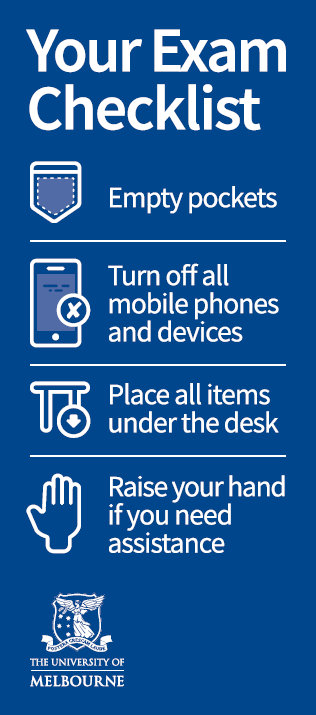Stress less this exam period
You put your hand up to let the invigilator know you need to go to the bathroom. As you stand the invigilator asks if you have anything in your pockets and suddenly you remember that you left your phone in your pocket… and it’s still on.

Exam time is stressful and let’s be honest, the experience of walking into the Royal Exhibition Building (REB) with up to 1000 other students can really add to that general feeling of anxiety. Unfortunately, for some of our students, this stress results in forgetfulness or causes them to do things that they wouldn’t usually do.
As such, we’ve put together this handy checklist for students who haven’t completed a University of Melbourne exam before, or as a refresher for everyone. Remember to pay attention to the University’s exam rules to avoid any undue stress during your exams. Our top ten reminders and tips are:
- Make sure you check where your exam is. Leave plenty of time to get to the exam venue and remember that there can be public transport delays, so plan to be there early.
- Remember there is no secure storage for personal possessions at REB. You can leave your backpack in the storage cage, but you’ll need to bring any valuable items with you to your desk. It might be safer to leave them at home.
- Bring your student card to all exams.
- Do not bring any exam study notes into the exam venue. If your exam allows a cheat sheet then ensure you double check the requirements of that cheat sheet (tip: check if it should be hand written, double sided or single sided)
- Turn off your mobile phone
- Empty your pockets and place all items (other than authorised materials) on the floor under your exam desk.
- Do not pick up your pen to write (even your student ID number!) before being told this is allowable. All exams have a ‘reading time only’ period at the start.
- Put your pen down at the time the Pen’s Down announcement is made. If you need to complete the front cover put your hand up and advise one of the examiners before using your pen again.
- If you feel unwell and can’t continue the exam, put your hand up and tell an invigilator immediately.
- If you are unwell and it impacts upon your ability to complete an exam or assessment then you should see a doctor. There are an increasing number of online doctors and in some instances our students have been caught out by online services posing as doctors. It is always safest to see a doctor in person, but if you do have to see a doctor online, make sure to check for their registration here. Whether you are seeing a doctor online or in person they will always want to discuss your symptoms with you and that will usually be via video link or phone. Having a regular doctor you see is best practice as they have your medical history and are able to make a complete assessment of your health. Do not accept a medical certificate from a third party who is not a doctor and if you are in doubt then seek help.
To be really prepared, read the full list of examination rules, authorised and unauthorised materials here. You can also find out about special consideration processes here.